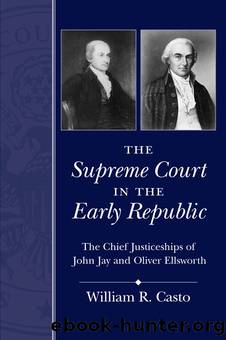The Supreme Court in the Early Republic by Casto William R.;

Author:Casto, William R.;
Language: eng
Format: epub
Publisher: University of South Carolina Press
Published: 2012-08-15T00:00:00+00:00
COMMON-LAW CRIMES
Another of the Justicesâ controversial practices was their espousal of a system of common-law crimes triable in federal court. In terms of cases actually triedâeven the number of federal criminal casesâcommon-law crimes were virtually insignificant during the 1790s. But federal common-law prosecutions eventually assumed a particularly high profile in the political arena and were widely covered in the press. By the end of the decade, these famousâor infamousâprosecutions had come to epitomize the Jeffersonian Republicansâ firm belief that the Federal government was bent on an undesirable and unconstitutional aggrandizement of power. Thomas Jefferson was complaining that all the other Federalist outrages were âsolitary, inconsequential timid things in comparison with the audacious, barefaced and sweeping pretension to a system of law for the U.S. without the adoption of their legislature, and so infinitely beyond their power to adopt.â9
The Justices did not initially address the issue of nonstatutory crimes because the early cases that came before them did not require a resort to unwritten law. The Congressâs failure to pass a crimes act in its first session could have forced an early grappling with the issue. On April 4, 1790, the day before opening his first circuit court in New York City, Justice Cushing was urging the enactment of a federal crimes bill. He did ânot know in what predicament our Courts will be as to carrying into Execution punishment for pyracies & felonies on the high Seas & some other matters.â Nevertheless, some ten days later, two men were indicted, tried, and convicted before Cushing, Chief Justice Jay, and District Judge James Duane for conspiracy to destroy a ship and murder the captain. The federal crimes act, however, had yet to be passed, so these convictions were necessarily premised upon a nonstatutory maritime law of crimes. Evidently the issue of the federal courtsâ authority to enforce nonstatutory criminal laws was not raised, and neither Justice Cushing nor the other members of the court addressed it. The two miscreants were sentenced without comment to the pillory, a public whipping, and six months in jail.10
Download
This site does not store any files on its server. We only index and link to content provided by other sites. Please contact the content providers to delete copyright contents if any and email us, we'll remove relevant links or contents immediately.
The Secret History by Donna Tartt(18232)
The Social Justice Warrior Handbook by Lisa De Pasquale(11963)
Thirteen Reasons Why by Jay Asher(8472)
This Is How You Lose Her by Junot Diaz(6463)
Weapons of Math Destruction by Cathy O'Neil(5854)
Zero to One by Peter Thiel(5507)
Beartown by Fredrik Backman(5372)
The Myth of the Strong Leader by Archie Brown(5250)
The Fire Next Time by James Baldwin(5033)
How Democracies Die by Steven Levitsky & Daniel Ziblatt(4972)
Promise Me, Dad by Joe Biden(4916)
Stone's Rules by Roger Stone(4875)
100 Deadly Skills by Clint Emerson(4700)
A Higher Loyalty: Truth, Lies, and Leadership by James Comey(4567)
Rise and Kill First by Ronen Bergman(4554)
Secrecy World by Jake Bernstein(4407)
The David Icke Guide to the Global Conspiracy (and how to end it) by David Icke(4397)
The Farm by Tom Rob Smith(4332)
The Doomsday Machine by Daniel Ellsberg(4253)
